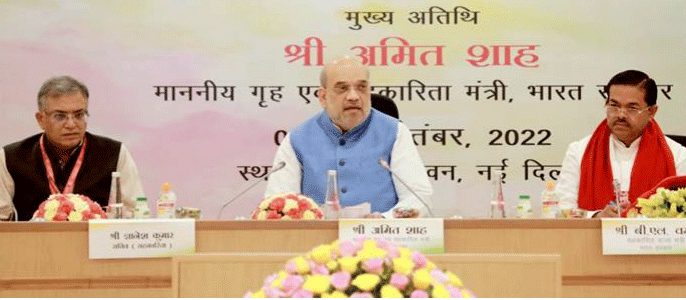The Ministry of Cooperation in India, under the leadership of Prime Minister Shri Narendra Modi, has embarked on a multifaceted journey to strengthen and empower the cooperative sector across the country. This comprehensive overview delves into the key initiatives and programs undertaken by the Ministry, spanning financial assistance for deep-sea trawlers to the establishment of a Cooperative University.
New National Cooperation Policy and Database:
To realize the vision of ‘Prosperity through Cooperation,’ Minister of Cooperation Shri Amit Shah initiated the formulation of a new National Cooperation Policy. A committee with 49 members, including experts and stakeholders, has been working diligently to finalize this policy. Simultaneously, the Ministry is developing a comprehensive National Cooperative Database, mapping over 7.88 lakh cooperative societies across various sectors in a phased manner. The belief is that a robust database is crucial for the planned development of the cooperative sector.
Education and Training
Recognizing the need for trained manpower, Minister of Cooperation Shri Amit Shah aims to establish a National Cooperative University dedicated to education, training, consultancy, research, and development. This specialized university is envisioned to ensure a sustainable, adequate, and quality supply of trained personnel for the cooperative sector. Additionally, the National Council for Cooperative Training (NCCT) has been actively organizing training programs for personnel, members, and board members of Cooperative Societies, surpassing its targets and reaching a wide audience through published articles in various languages.
Computerization Initiatives
The Ministry has approved schemes for the computerization of Agriculture and Rural Development Banks (ARDBs) and the offices of Registrars of Cooperative Societies in States/Union Territories. These initiatives aim to enhance efficiency, transparency, and accessibility, ultimately benefiting Cooperative Societies and their members.
Refund to Investors and Implementation Strategy:
A significant achievement is the successful filing of a petition in the Supreme Court by the Ministry of Cooperation, leading to the transfer of Rs 5000 crore from Sahara-SEBI refund account to the Central Registrar of Co-operative Societies. The launch of the ‘Central Registrar – Sahara Refund Portal’ ensures a transparent and digital disbursement process. The implementation strategy involves regular review meetings at the national, state, and district levels, emphasizing the collaborative approach taken to ensure effective execution of initiatives.
Major Programs and Seminars:
The Ministry has organized and participated in various programs and seminars, including the Indian Cooperative Conference, Foundation Day function of NABARD, and National Seminars on topics like FPOs, cooperative exports, improved seed production, and promotion of organic products. These events have been platforms for launching new initiatives, unveiling logos and websites, and distributing certificates, reflecting the Ministry’s commitment to continuous engagement and progress.
Financial Inclusions and Deep Sea Trawlers
One notable initiative is the financial assistance provided by the National Cooperative Development Corporation (NCDC) for deep-sea trawlers. The Ministry, in coordination with the Department of Fisheries, Government of India, has sanctioned Rs 20.30 crore for the purchase of 14 deep-sea trawlers for Fisheries Cooperative Societies in Maharashtra. This move aligns with the broader vision of fostering prosperity through cooperation.
GeM Portal and Cooperative Societies:
Under the visionary leadership of Prime Minister Shri Narendra Modi, Cooperative Societies have been approved as ‘Buyers’ on the Government e-Marketplace (GeM) as of June 1, 2022. Minister of Cooperation Shri Amit Shah launched the onboarding of Cooperative Societies on the GeM Portal in August 2022. This step allows these societies access to around 60 lakh authentic sellers/service providers across the country, facilitating a seamless procurement process. Notably, 559 Cooperative Societies have already been onboarded, with encouragement for them to also register as sellers on GeM.
In conclusion, the Ministry of Cooperation in India has set a comprehensive agenda for the development and empowerment of the cooperative sector. From financial assistance to inclusive policies, education, and training, the initiatives reflect a holistic approach to realizing the vision of ‘Prosperity through Cooperation.’ The active involvement of stakeholders, regular reviews, and the launch of various portals and schemes underscore the commitment to transparency, efficiency, and sustainable growth in the cooperative domain.
